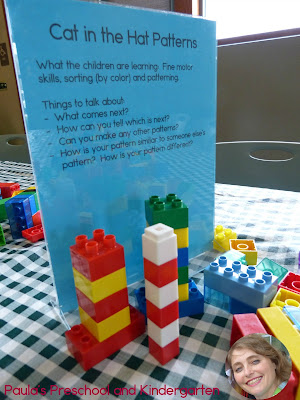Chances are good that if you are reading this, you already know Dr. Seuss' birthday was this week, on March 2nd. What's a library story time to do, but to celebrate?
Choosing which books to read was hard - there are so many great Seuss
books. I'm sure you have your favorites! Ms. Debbie finally settled on Green Eggs and Ham and One Fish Two Fish Red Fish Blue Fish.
Deciding which follow up activities to do was also a challenge.
There's an abundance of ideas on the internet, I've gathered some of
them here on my Seuss Pinterest board.
We
knew we had to have something tactile for our families - our kiddos
seem to crave paint and sensory play, so we try to include something
that will meet that need each week. We also try to include STEAM
(Science, Technology, Engineering, Art and Math), because the library is
about so much more than literacy!
Looking at my stack of Seuss books, I realized a great math concept to tie in was patterning: just think of the Cat's Hat. Out came some blocks and unifix cubes! As usual, some kiddos were inspired by our ideas, and others found their own direction in the materials. Manipulating the blocks, choosing the color combinations they like, and balancing their creations are just as relevant concepts as making a pattern - and obviously, for some children, those were more important concepts to explore right now. This doesn't mean they won't learn patterning - there will be many, many more opportunities to explore these materials and others!
Watching and listening to the children interact with the materials and with their caregivers teaches Ms. Debbie and I just as much as exploring the materials we set out teaches the kiddos! I loved hearing children describe their patterns as zebra pattern (black and white) and bumblebee pattern (black and yellow).
They don't have the mathematical language to describe these as AB or ABB patterns, but found language that clearly expressed what they saw! I also watched a 3 year old take a bumblebee pattern and a rainbow pattern, and start to put them together. He looked at them, and realized that they were very different - and separated them again - and grinned at his mom as he did.
We put out hand painting for the children, with a suggestion of One Fish Two Fish, and an example of red fish and blue fish. Most of the time we don't put out a model or suggestion of what an activity will look like, because that tends to limit the potential children see in the materials. We're not looking to have 40 identical craft projects at the end of the day - we're looking for 40 satisfied children who have explored materials and have taken away their own learning from them! Still, occasionally our grown up friends need help to figure out which direction to go - and I expected that this activity would primarily involve our caregivers painting on the children's hands.
I was wrong! (Not the first time! :-) ) I LOVED seeing children painting their own hands, and even one painting her momma's hand! How cool are our parents, that they can not only encourage this kind of creativity, but even let their children draw them right on in to the fun!
We did have a whole lot of fish looking hand prints - and also pages and pages crowded with little red and blue hand prints. The sensory element of this painting activity was thoroughly explored, and found to be satisfying!
There was another activity, which I think was the most loved: hopping and popping! A little bubble wrap goes a long way with the preschool crowd - think about how satisfying it is to pop each little bubble, the sound it makes... and then add jumping and stomping! Oh yes, our children hopped and popped, and did not stop! (So did a few of the adults, possibly including me.)
Our final activity was our graph: Would you eat green eggs and ham? The results were more than a little inconclusive this week: one of our younger siblings discovered the glue stick and paper circles, and went to town. I watched him at it, and knew he was thoroughly skewing our results - but it just didn't seem important enough to stop him. Each family still stopped at the graph, and children and caregivers talked about what each child thought. Everyone had a chance to express their opinion, and add a circle, learning about the process of choosing, expressing themselves, and participating in a democracy by voting. Sure, one little guy was voting over and again, but at 2 years old, he has time to develop self regulation. For right now, knowing how to use a glue stick will suffice.













No comments:
Post a Comment